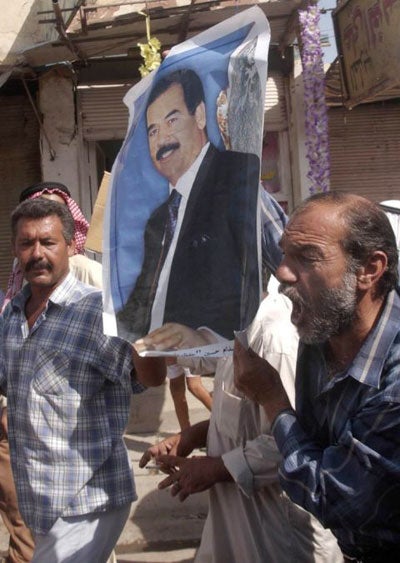Sunni leaders mull concessions by Shia as constitution talks go to the wire

Hajim al-Hassani said that negotiators from the Shia majority had proposed a number of amendments to an existing draft to meet Sunni demands.
Although Sunni leaders had yet to give a definite response, he said the amendments did deal with issues which were troubling the Sunnis. But he added that no accord had been clinched and a final decision would only be clear tomorrow.
The Shia concessions followed an intervention by US President George Bush, who had urged Shia Muslim leaders by telephone to give ground.
Earlier there had been no signs that Sunni officials would accept the " final compromise offer" by the Shias and Kurds on the contentious issues of federalism and the banning of former Baathists from public life.
While outwardly declaring optimism over the political process, the US administration appeared to be preparing for its unravelling with urgent plans being drawn up to send more large-scale military reinforcements. The Pentagon had announced that two battalions of the 82nd Airborne, about 1,500 troops, will be deployed. But according to senior American sources, a brigade of some 5,000 will be sent to combat the violent fallout from the constitution crisis.
President Bush asked the Shia leader Abdul-Aziz al-Hakim to change the draft charter's wording to mollify the Sunnis. At the same time Zalmay Khalilzad, the US ambassador, had appealed to Grand Ayatollah Ali al-Sistani, the spiritual leader of the Shias, for help.
The compromise being offered by the Shias and the Kurds is to propose that the mechanism of the federal structure will be left until elections scheduled for December. Similarly, the issue of Baath participation in politics would be left to the post-election assembly.
Shia officials declared that further compromise on the issue of the Baathists was not possible. The party, dominated by Sunnis, has been blamed for atrocities against Shia communities.
Mr Hassani said: "If we cannot reach an agreement, God forbid, the constitution will be put to the Iraqi people on 15 October [for referendum]." Sunni clerics, who urged a boycott of the elections earlier this year, are now carrying out a voter registration drive.
Sunni negotiators were insistent last night that not just the mechanism but the principles of federalism and Baath participation must be addressed.
Sadoun Zubaydi, a Sunni member of the drafting committee, said: "Both the principle and mechanism should be deferred. Our policy is decentralisation, but not political federalism with borders, division of resources, etc. That is separatism, not federalism."
The animosity between Sunni Arabs and the Kurds who are in fact also Sunni resurfaced, with Arab leaders accusing the Kurds of preparing the ground for a secession from Iraq.
"Federalism remains the core issue," said Mr Zubaydi. " Kurdish intransigence makes it difficult to hope for a compromise."
The Sunni Arabs have proposed granting federal status to three provinces in the Kurdish north, while the current draft imposes no limit on the number of provinces which can join a federal entity. This is seen by the Arabs as a Kurdish attempt to incorporate Kirkuk, with its oil wells, in a future autonomous state.
Ghazi al-Yawar, the Vice-President, who is a Sunni, said the current draft was written for the benefit of Kurds and Shias, and was "far from the aspirations of all Iraqi people. We want this constitution to maintain the unity of Iraq and give rights to all Iraqis."
Sunni officials maintain that federalism is simply a pretext for the Shias and the Kurds to carve up the oil-rich north and south of the country.
They are supported by the radical Shia cleric Muqtada Sadr and his followers in the relatively resource-poor central Iraq, who hold that rival Shia factions in the south are in cahoots with Iran.
The well-known preacher Tarek Abdullah declared: "Federalism is a dagger that the occupiers and their allies want to plunge into the body of the country. We must stop them."
Huge numbers of Sunnis and Shia followers of Sadr marched against the constitution yesterday in the Sunni city of Baquba, carrying photographs of Saddam Hussein and chanting slogans in support of the former dictator.
Around 100,000 Sadr supporters marched in eight Iraqi cities, including 30,000 who first gathered for a sermon in a Baghdad district of Sadr City. The demonstrators carried images of Iraq sliced up by a bloody knife and called for Arab unity.
Join our commenting forum
Join thought-provoking conversations, follow other Independent readers and see their replies
Comments
Bookmark popover
Removed from bookmarks